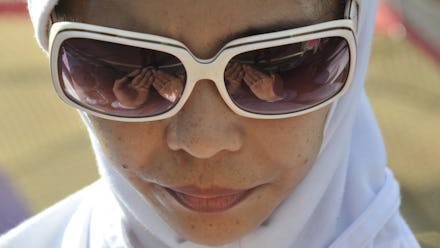Mona Eltahawy Demystifies Sex Talk for Other Devout Women

All too often, sex and sexuality among Muslim women is discussed in the context of sexual assault or barbaric punishments among Islamic societies in the Middle East and Asia.
But an increasing number of Muslim women are broadening that discussion to lift up other devout women.
Take for example Mona Eltahawy, an Egyptian Muslim woman who says she waited until she was 29 to lose her virginity out of a religious obligation requiring abstinence until marriage. She's been married and divorced. At 49, Eltahawy has been "making up for lost time," she said.
In an op-ed published in the New York Times Friday, she stated how she feels Muslim women should view sex and sexuality before and after marriage:
"It is I who own my body. Not the state, the mosque, the street or my family. And it is my right to have sex whenever, and with whomever, I choose."
Eltahawy said discussions of sex and sexuality have been seen as "the province only of so-called white feminism" for too long.
That kind of thinking perpetuates the idea that Muslim women in war-torn Middle East nations or impoverished South Asian communities "shouldn't have consent and agency, [and] the right to enjoy sex and her own body."
Eltahawy wrote the 2015 book Headscarves and Hymens: Why the Middle East Needs a Sexual Revolution, in which she offers resources to Muslims women with questions about their bodies, sex and sexuality.
Excluding Muslim women from the so-called sexual revolution of women worldwide does more harm than good, Eltahawy wrote in the Times op-ed:
"When sex is surrounded by silence and taboo, it is the most vulnerable who are hurt, especially girls and sexual minorities."